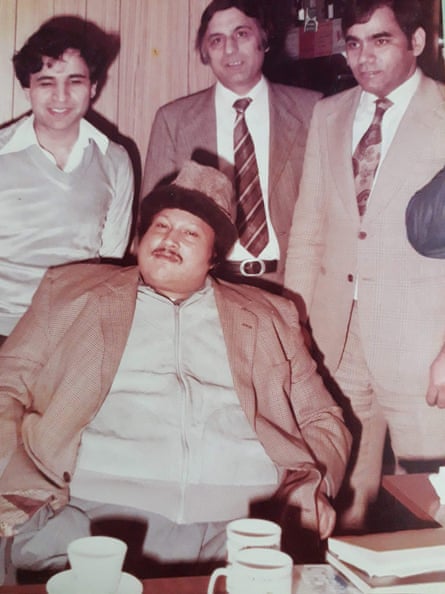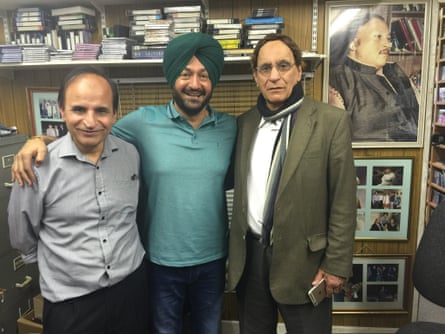When Muhammad Ayyub moved to Birmingham from Pakistan in 1961, he quickly felt homesick. Back again in Gujrat, he had liked a “pleasant and social life”, collecting records, viewing films and going to festivals together with his teaching job. But right here, in the early yrs of south Asian migration to the West Midlands, there was small he could engage with – he and his small community only had each other’s properties to assemble in and reminisce. “Now we have Television channels, live shows and musicians browsing from India and Pakistan, but at that time it was different,” he claims. “We skipped our music, we missed our tradition.”
Fed up with lower-paid, unstable work, Ayyub opened a shop offering transistor radios on Balsall Heath Highway in 1966. All over the similar time, the cinema upcoming doorway experienced introduced Sunday matinee screenings for south Asian movies and folks would acquire in his store afterwards, discussing the scores and expressing longing for the seems they had developed up with. Prompted by their requests, Ayyub started importing information from India and Pakistan. The preliminary purchase, which took more than six weeks to get there by ship, went like hotcakes, he remembers, smiling.
What started as a humble, community-minded endeavour went on to develop into Oriental Star Agencies (OSA), 1 of the most significant south Asian document labels in the region and the cornerstone of United kingdom bhangra. “OSA launched Asian audio to the earth and passed it on to the upcoming generation,” Ayyub tells me, now aged 84. “If it was not for this label, people today would have dropped their tradition, their language, their music.”

As a lot more people arrived, need elevated. By then, OSA was putting in wholesale orders for south Asian people, qawwalis, pop audio and funk, as well as tunes from Bollywood and its Pakistani equivalent, Lollywood. With only 1 other south Asian audio distributor in the Uk, the Balsall Heath shop grew to become inundated with advance orders and website visitors from throughout the nation. “People utilised to wait around for weeks and weeks for their favourite information,” Ayyub states. “They felt pretty deprived.”
In 1969, the enterprise introduced a label offshoot following Ayyub was approached by community Punjabi folk outfit the Bhujhangy Team to release a report. Their fusion of western and Asian instruments and rhythms turned vastly well-known and laid the foundations for professional bhangra in the British isles. Nurturing talent in the West Midlands and past, OSA would go on to start the Uk careers of top south Asian and British Asian stars, which include Malkit Singh, Nusrat Fateh Ali Khan and Bally Sagoo. “We set Birmingham on the planet songs scene,” Ayyub says.
By 2000, Singh would be named the largest selling bhangra artist ever with almost 5m album profits at that issue, most of them on OSA Khan would be signed by Peter Gabriel’s Real Environment label and collaborate with Pearl Jam’s Eddie Vedder, a massive crossover results designed on the basis of approximately 125 OSA-released albums.
Meanwhile, right after decades of creating new music in his bedroom, Sagoo began doing the job as an in-dwelling producer at OSA in 1989, then launched his have solo records on the label. Drawing on the wealth of cultures in Birmingham, his tunes welded dub and reggae basslines with Indian percussion and vocals. “They launched my profession,” Sagoo suggests of OSA, recalling how he swapped his pirate radio slots, bootlegs and handmade CDs offered outside the house of colleges for intercontinental acclaim and pop good results: his 1996 bhangra/trip-hop crossover keep track of Dil Cheez attained No 12 in the Uk charts.
“The desire was to go into a studio but who was going to give you the prospect?” he says, citing the hostility and scepticism of white market figures in the early 1990s. Inside 4 years of functioning with OSA, Sagoo signed with Sony to launch Bollywood Flashback in 1994. “It was the initial Indian report played on Radio 1 – which is how really hard it was. You required that break.”
Sagoo’s layering of digital tunes with conventional types bridged the gap in between various generations, permitting British Asians born to the finish of the century to hook up with their parents’ heritage and languages – and ushered in the Asian Underground, continued by the likes of Asian Dub Basis and Mercury prize-winning Talvin Singh.
But regardless of the accomplishment of the label and the genres it cultivated, the story at the rear of OSA and British Asian music remains very little instructed. “When we introduced Bally Sagoo’s next album Wham Bam 2 in 1992, we offered 50,000 vinyls and CDs [in] the initially 7 days,” Ayyub states. “But as they had been not registered in the mainstream charts, English folks did not know that this kind of artists existed.”
OSA continued as a distributor and label into the new millennium its output attained a new audience with many tracks from the label getting bundled on the Bend It Like Beckham soundtrack in 2002. But in 2017, just after 5 decades of business enterprise, the decline of bodily gross sales and increasing overheads compelled the label and the Balsall Heath shop to close.
As the web-site was remaining emptied, artist and archivist Faisal Hussain, whose father and grandfather used to dig all over for information there, hurried above to salvage what he could in his family’s frozen meals corporation van. “I bought a phone from Mr Ayyub stating: ‘If you want anything at all, you better appear now,’” he claims. “It was like the simply call you get when an individual is ill in healthcare facility.”

In the 5 many years given that, Hussain has been developing an on the internet and actual physical archive of the 3,000 information that were being saved, now on present in the South Asia gallery of Manchester Museum as section of his Real Form challenge. He believes it is a a single of a type collection that is consultant of OSA’s expansive output, spanning Partition-era phonographs to 00s remixes, by way of classical new music, electro ragga and Hindi Abba addresses. “It’s a single of the only institutions that bookmarks the whole history of south Asian songs,” Hussain says.
But the archive is more than just a catalogue of exciting and uncommon audio: it is also a social heritage, tracing the modifying lifestyles and listening practices of the 20th-century diaspora in the Midlands. Together with the records are photographs of shoppers and pals flicking via crates of audio, as very well as letters from listeners of Ayyub’s previous BBC radio show East in West. Created in Urdu and English, the handwritten notes detail requests for music to be played for relatives users and loved kinds.
“These are humble yet strong letters of currently being below,” Hussain claims. “Because that’s what our mother and father had to be: humble and solid. The archive tells the story of south Asian persons in Britain present.” He hopes that it can locate a long term, freely obtainable residence.
“It’s peculiar that this background has not really been explained to, but we are going to start off telling it,” he provides. “If museums and establishments don’t hear to what we have to say, then we have to construct our own.” And despite the “heartbreaking” fate of OSA, Ayyub is thrilled to see its record preserved for future generations: “We have still left a legacy that will previous for centuries.”